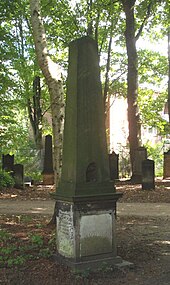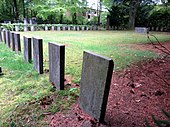Georg Hartog Gerson
Georg Hartog Gerson (born August 25, 1788 in Hamburg ; † December 3, 1844 there ) was a military doctor .
Life
Gerson came from a family of doctors who had lived in Hamburg and Altona since the 17th century. His grandfather ran the Jewish hospital in Altona, his father, his uncle and his older brothers also worked as doctors. His parents were Hartog Hirsch Gerson († 1801) and his wife Peierle Rahel Dischere.
After initial training in his parents' house, he attended grammar school, where he devoted himself to classical languages and the natural sciences, especially botany . He studied in Berlin from 1805 to Göttingen in 1809, where he on April 7, 1810 Doctor of Medicine doctorate . In 1811 he completed his habilitation in Hamburg and then joined the King's German Legion (KGL) as a hospital mate .
Military time
Already on August 12, 1811 he was proposed for promotion to assistant surgeon and received this commission on September 6, 1811 for the 5th Line Battalion of the KGL. He was in action on the Pyrenees Peninsula , in southern France , the Netherlands and in the battle of Waterloo . Here the self-sacrificing and energetic commitment of Gerson was particularly emphasized:
“A rare zeal for service animated the assistant surgeon Gerson of this fifth line battalion, while he not only remained in the middle of the quarry during the hottest fight and in the fierce fire connected the wounded of his battalion with zeal and skill, but also those of the neighboring Hanoverian troops rendered useful help in his art. By saving the lives of many a good man in this way, while voluntarily exposing his own, he rightly aroused the admiration of every eye-witness, and the Colonel von Ompteda, as commander of the brigade, expressed his high appreciation, shortly before the attack in which he remained , in the most flattering way possible. If, in spite of such deeds, this recognition has remained the only one for Gerson until now, it will still be a rewarding feeling for him to perceive that his noble devotion has not been forgotten by the still living comrades. Less happy in receiving an external award than some of his fellow artists, may the good surgeon this mention of his self-sacrificing service be at the same time a reminder of the said comrades. "
After the battle, Gerson was entrusted with the management of the Hôpital de la Gendàrmerie in Brussels .
Civil career
After the dissolution of the King's German Legion, he returned to Hamburg and initially devoted himself primarily to writing, but his practice soon grew and he gained a significant reputation as a doctor and surgeon . In 1833 he was appointed teacher of anatomy at the medical-surgical school and worked temporarily as the first surgeon at the General Hospital .
In 1839 he fell ill with a chronic disease that led to his sudden death on December 3, 1844 in Hamburg. His grave was originally in the Jewish cemetery on Grindel . During the National Socialist era , the cemetery was closed and the dead and the tombstones were reburied in the Ohlsdorf Jewish cemetery (Ilandkoppel) in Hamburg. The grave column can still be found there today. It bears the inscription on one side:
Mitissimus Aggressor - Acerrimus Defensor (a mild attacker - a sharp defender)
Georg Hartog Gerson is commemorated by a memorial stone in the neighboring site of honor.
The uniform skirt that Gerson is said to have worn as a troop doctor at the Battle of Waterloo on June 18, 1815, is now in the Museum of Hamburg History and is probably the only remaining medical uniform of the English Allied troops from the time of the Napoleonic Wars .
family
He was married to Julie Schwabe (1801-1833) since July 31, 1822. The couple had two children:
- Caesar Hartog (1823-1886), ophthalmologist ⚭ 1861 Julia Jonassohn (* 1831)
- Ida Sara Pauline (1824–1881) ⚭ Moritz Adolf Unna (1813–1888)
Awards
- Waterloo Medal (United Kingdom)
Publications
- as publisher: magazine of foreign literature for all medicine. Hamburg 1817-1819 and 1821-1835.
- De forma corneae oculi humani. Dissertation. Göttingen 1810. Digitized
- About the hospital fire according to my own experiences during the Spanish War of Liberation and in Belgium. BG Hoffmann and Aug. Campe, Hamburg 1817. Digitized
literature
- August Hirsch: Gerson, Georg Hartog . In: Allgemeine Deutsche Biographie (ADB). Volume 9, Duncker & Humblot, Leipzig 1879, p. 57 f.
- J. Michael: History of the medical association and its members. Hamburg 1896.
- Hans Schröder: Lexicon of Hamburg writers. 1854, p.480f
- N. Ludlow Beamish: History of the King's German Legion. 2 volumes, 1832 and 1837. (Reprint: 2 volumes, Naval & Military Press, Dallington, East Sussex 1997, ISBN 0-9522011-0-0 )
- Guide through the Museum of Hamburg History.
- Biographical lexicon of outstanding doctors of all times and peoples, p.536f
- New nekrolog der Deutschen for the year 1844, Volume 22, S.793f
- Word of memory of Dr Georg Hartog Gerson in Oppenheim's magazine for the whole of medicine
Web links
Individual evidence
- ↑ Staats und Gelehre Zeitung des hamburgischen impartial correspondents, 1922, wedding announcement
- ^ Staats und Gelehre Zeitung des hamburgischen impartial correspondents, 1923, birth announcement
| personal data | |
|---|---|
| SURNAME | Gerson, Georg Hartog |
| BRIEF DESCRIPTION | Hanoverian military doctor |
| DATE OF BIRTH | August 25, 1788 |
| PLACE OF BIRTH | Hamburg |
| DATE OF DEATH | December 3, 1844 |
| Place of death | Hamburg |



